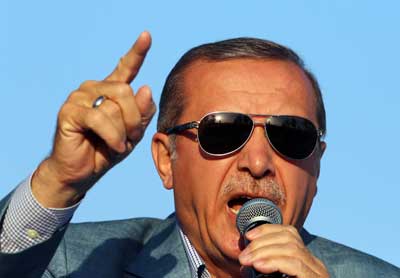Istanbul, June 1, 2015–The Committee to Protect Journalists condemns President Recep Tayyip Erdoğan’s legal threats against pro-opposition daily newspaper Cumhuriyet and Can Dündar, its editor-in-chief, whom the president accused of espionage during a live broadcast Sunday night on state-run television.
“We call on Recep Tayyip Erdoğan to stop bullying journalists and news outlets such as Can Dündar and Cumhuriyet just because he doesn’t like what they report,” CPJ Europe and Central Asia Program Coordinator Nina Ognianova said in New York. “The president’s statements have often served as cues for Turkish prosecutors to initiate punitive legal action against the government’s critics.”
The president said he would file a lawsuit in response to a Cumhuriyet article published on May 29 about allegations that trucks belonging to the National Intelligence Agency (MİT) were used to smuggle arms to rebel groups in Syria, according to news reports. The article, written by Dündar, included images that the paper claimed were part of an official investigation into the smuggling allegations. The article alleged that artillery shells, mortar bombs, and rounds of ammunition for machine guns had been concealed under boxes of medicine, the English-language Hürriyet Daily News said. The government said in January 2014, when security forces stopped the trucks, that the trucks were carrying humanitarian aid, according to local reports.
“The person who wrote this story will pay a heavy price for it; I won’t let him go unpunished,” Erdoğan said during a regular appearance on the state-run channel TRT Haber, according to the English-language daily Today’s Zaman. The president accused Cumhuriyet of espionage, Today’s Zaman said.
The Bureau of Terror and Organized Crimes, under the public prosecutor of İstanbul, is investigating Dündar on espionage allegations, the independent news website Bianet reported. The prosecutor’s office announced that other media outlets that carry the Cumhuriyet story will be placed under investigation for “obtaining state security documents,” “exposing secret information,” and “making propaganda for terrorist organization,” according to reports. Turkey’s vague terrorism and penal laws are frequently used by authorities to punish critical journalists, CPJ research shows.
Last year, Turkish authorities imposed a ban on coverage of allegations that MİT had sent military aid to Syrian rebels in the disguise of humanitarian aid, according to reports. Prime Minister Ahmet Davutoğlu told journalists that the contents of the Syria-bound trucks belonging to the MİT was “nobody’s business,” the pro-government Daily Sabah newspaper reported on May 31.
In an editorial in Cumhuriyet today, Dündar defended the decision to publish the article. “We are not civil servants who are supposed to keep state secrets, but rather journalists,” he wrote, according to English-language reports. Dündar added in the editorial that Cumhuriyet will continue to report on the government “in the interests of the state, the people, and the media.”
Both as Turkey’s prime minister and now as president, Erdoğan has led an anti-press campaign, personally filing defamation lawsuits against journalists, publicly lashing out against critics, and pressuring news organizations to rein in critical staffers. These actions have sown widespread self-censorship as news outlets and their journalists, fearful of financial, professional, or legal reprisals, shy away from sensitive topics, CPJ research shows.
